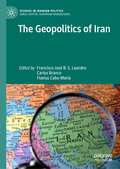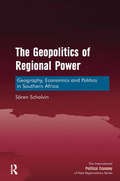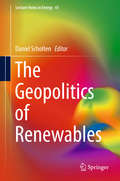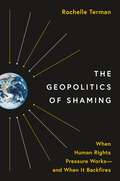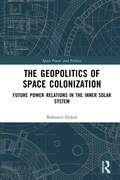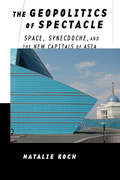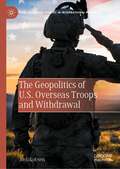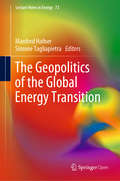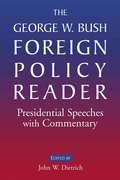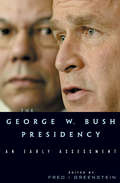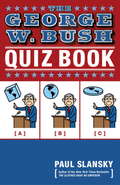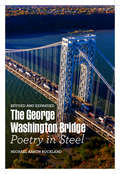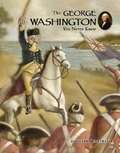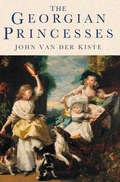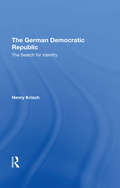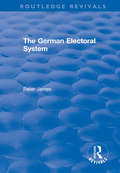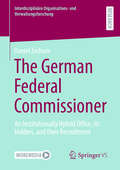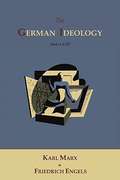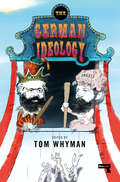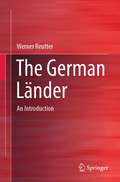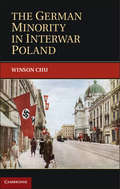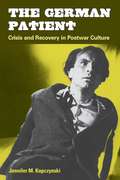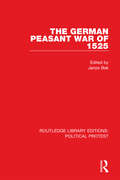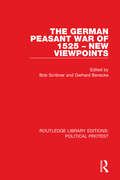- Table View
- List View
The Geopolitics of Iran (Studies in Iranian Politics)
by Francisco José B. S. Leandro Carlos Branco Flavius Caba-MariaThis book assesses Iran’s role in contemporary geopolitics. In particular, it examines three main intertwining circles: Iran’s development and political challenges, its relationships with neighbouring countries, as well as its relations with the major global powers — China, the European Union, Russia, and the United States. With contributions from over 20 authors, the book spans such critical aspects of contemporary geopolitics as modern history, natural resources, the economy, the social-political context, and strategic thinking. Particular focus is placed on Iran’s relations with its neighbours - Afghanistan, Iraq, Israel, Pakistan, and the Persian Gulf States. Furthermore, the book offers both a bilateral and multilateral dimension on how nuclear sanctions imposed on Iran have impacted its strategic planning, from the economic and military perspectives.
The Geopolitics of Regional Power: Geography, Economics and Politics in Southern Africa (The International Political Economy of New Regionalisms Series)
by Sören ScholvinIn the last two decades, various states from the Global South have emerged as important players in international relations. Most popular among them is China. Brazil, India and South Africa have also taken essential roles in global and regional politics. Compared to traditional great powers, they can be labelled ’regional great powers’ or ’regional powers’ because their influence is - with the exception of China - concentrated on their neighbourhood. The impact of regions, meaning the impact of geography, on the economics and politics of regional powers is surprisingly understudied. This book analyses how geographical conditions influence the regional economics and politics of South Africa, allowing the author to delineate its region of influence.
The Geopolitics of Renewables (Lecture Notes in Energy #61)
by Daniel ScholtenRenewable energy represents a game changer for interstate energy relations. The abundant and intermittent nature of sources, possibilities for decentral generation and use of rare earth materials, and generally electric nature of distribution make renewable energy systems very different from those of fossil fuels. What do these geographic and technical characteristics imply for infrastructure topology and operations, business models, and energy markets? What are the consequences for strategic realities and policy considerations of producer, consumer, and transit countries and energy-related patterns of cooperation and conflict between them? Who are the likely winners and losers? The Geopolitics of Renewables is the first in-depth exploration of the implications for interstate energy relations of a transition towards renewable energy. Fifteen international scholars combine insights from several disciplines - international relations, geopolitics, energy security, renewable energy technology, economics, sustainability transitions, and energy policy - to establish a comprehensive overview and understanding of the emerging energy game. Focus is on contemporary developments and how they may shape the coming decades on three levels of analysis: #65533; The emerging global energy game; winners and losers #65533; Regional and bilateral energy relations of established and rising powers #65533; Infrastructure developments and governance responses The book is recommended for academics and policy makers. It offers a novel analytical framework that moves from geography and technology to economics and politics to investigate the geopolitical implications of renewable energy and provides practical illustrations and policy recommendations related to specific countries and regions such as the US, EU, China, India, OPEC, and Russia.
The Geopolitics of Shaming: When Human Rights Pressure Works—and When It Backfires (Princeton Studies in International History and Politics #213)
by Rochelle TermanA bold new perspective on the strategic logic of international human rights enforcementWhen a government violates the rights of its citizens, the international community can respond by exerting moral pressure and urging reform. Yet many of the most egregious violations appear to go unpunished. In many cases, shaming not only fails to induce compliance but also incites a backlash, provoking resistance and worsening human rights practices. The Geopolitics of Shaming presents a new theory on the strategic logic of international human rights enforcement, revealing why and how states punish violations in other countries, when shaming leads to an improvement in human rights conditions, and when it backfires.Drawing on a wide range of evidence—from large-scale cross-national data to original survey experiments and detailed case studies—Rochelle Terman shows how human rights shaming is a deeply political process, one that operates in and through strategic relationships. Arguing that preexisting geopolitical relationships condition both the causes and consequences of shaming in world politics, she shows how adversaries are quick to condemn human rights abuses but often provoke a counterproductive response, while friends and allies are the most effective shamers but can be reluctant to impose meaningful sanctions.Upending conventional wisdom on the role of norms in world affairs, The Geopolitics of Shaming demonstrates that politicization is integral to—not a corruption of—the success of the global human rights project.
The Geopolitics of Space Colonization: Future Power Relations in the Inner Solar System (Space Power and Politics)
by Bohumil DobošThis book presents a geopolitical analysis of the upcoming human exploration of celestial bodies in the inner solar system by the major space powers. It utilizes a systemic approach to the analysis of political events in space to develop a comprehensive overview of the factors influencing planned or proposed missions to the selected objects – the Moon, Mars, and asteroids. As a result of this analysis, the book establishes forward-looking scenarios of possible developments to highlight the main fault lines of the upcoming operations beyond the currently most heavily utilized terrestrial orbits. This framework is rooted in a holistic overview of factors relevant to the mid-term settlement and mining efforts and allows us to highlight the main focal points that will determine the future power distribution inside the inner solar system. The methodology is based on the analysis of an interplay of numerous factors deemed crucial for the decision-making of the major space powers and their capacities to promote their interests in a given region. Major space powers are, for the purpose of this book, understood as those actors with a realistic ability to participate in or lead the inner solar system colonization and mining missions in the mid-term future for which scenario-making is the most suitable. Given the realities of space travel, however, smaller actors are also taken into consideration as a part of cooperative efforts which are, nonetheless, dominated by the major players or, alternatively, as possible spoilers of the efforts in several regional settings. The book thus provides an in-depth analysis of the possible futures regarding the nearing competition over the celestial bodies This book will be of much interest to students of space power and policy, geopolitics, airpower, and International Relations.
The Geopolitics of Spectacle: Space, Synecdoche, and the New Capitals of Asia
by Natalie KochWhy do autocrats build spectacular new capital cities? In The Geopolitics of Spectacle, Natalie Koch considers how autocratic rulers use "spectacular" projects to shape state-society relations, but rather than focus on the standard approach—on the project itself—she considers the unspectacular "others." The contrasting views of those from the poorest regions toward these new national capitals help her develop a geographic approach to spectacle.Koch uses Astana in Kazakhstan to exemplify her argument, comparing that spectacular city with others from resource-rich, nondemocratic nations in central Asia, the Arabian Peninsula, and Southeast Asia. The Geopolitics of Spectacle draws new political-geographic lessons and shows that these spectacles can be understood only from multiple viewpoints, sites, and temporalities. Koch explicitly theorizes spectacle geographically and in so doing extends the analysis of governmentality into new empirical and theoretical terrain.With cases ranging from Azerbaijan to Qatar and Myanmar, and an intriguing account of reactions to the new capital of Astana from the poverty-stricken Aral Sea region of Kazakhstan, Koch’s book provides food for thought for readers in human geography, anthropology, sociology, urban studies, political science, international affairs, and post-Soviet and central Asian studies.
The Geopolitics of U.S. Overseas Troops and Withdrawal (Palgrave Studies in International Relations)
by Jo JakobsenWhy is it so difficult for a great power or a hegemon to retrench its overseas military power? Specifically, why are U.S. military bases and troops still largely where they were five years ago, twenty years ago, or even seventy years ago? Through developing a theory of great-power persistence, this book offers an explanation. Closely aligned with neoclassical realism, the theory argues that the murkiness of the anarchic international system combines with specific psychological inclinations of individuals to produce “better-safe-than-sorry” policies. In the United States, decisions on troop deployments are powerfully influenced by the broader foreign-policy community. Its members tend to be risk-averse and highly sensitive to the possibility that even minor troop withdrawals might set off harmful geopolitical chain reactions. Preferring the status quo over any uncertain alternative, they want their country to continue to maximize its influence and project its military power abroad in order to steady wobbling geopolitical “dominoes.” The theory is put to the empirical test through a systematic analysis of U.S. overseas troop deployments, withdrawal attempts, and retrenchment resistance during the presidency of Donald Trump, which represents an ideal test case for these mechanisms. Even if U.S. voters elected a retrenchment advocate as president, and despite that the United States is a gradually declining power, the period saw very little change in U.S. overseas troop deployments. The book concludes that, barring any dramatic, unforeseeable international event, the vast network of overseas U.S. military bases and troops is likely to persist for a long time to come.
The Geopolitics of the Global Energy Transition (Lecture Notes in Energy #73)
by Simone Tagliapietra Manfred HafnerThe world is currently undergoing an historic energy transition, driven by increasingly stringent decarbonisation policies and rapid advances in low-carbon technologies. The large-scale shift to low-carbon energy is disrupting the global energy system, impacting whole economies, and changing the political dynamics within and between countries. This open access book, written by leading energy scholars, examines the economic and geopolitical implications of the global energy transition, from both regional and thematic perspectives. The first part of the book addresses the geopolitical implications in the world’s main energy-producing and energy-consuming regions, while the second presents in-depth case studies on selected issues, ranging from the geopolitics of renewable energy, to the mineral foundations of the global energy transformation, to governance issues in connection with the changing global energy order. Given its scope, the book will appeal to researchers in energy, climate change and international relations, as well as to professionals working in the energy industry.
The George W. Bush Foreign Policy Reader: Presidential Speeches with Commentary
by John W. DietrichIndia has become one of the hottest business stories in the news. Covering the fast-growing economy, the twists and turns of domestic politics, labor in the large informal sector, the cultural roots of Hindu nationalism, the foreign relations roller coaster, the business of Bollywood, and a special chapter covering the range of new resources about India available on the web, this unique book highlights and illuminates India's vastly changing fortunes.
The George W. Bush Presidency: An Early Assessment
by Fred I. GreensteinBetween his inauguration and September 11, 2001, George W. Bush's presidency appeared to lack focus. The rhetoric of the campaign trail did not readily translate into concrete policies and a closely divided Congress restrained executive action. The terrorist attacks on New York and Washington, however, changed all of that. In their aftermath, Bush emerged as a strong, decisive leader with a deep sense of purpose and certainty that inspired many Americans, even as it alienated much of the rest of the world.In The George W. Bush Presidency: An Early Assessment, noted presidential scholar Fred I. Greenstein brings together a distinguished group of political scientists to consider the first two-and-a-half years of the George W. Bush presidency, from his leadership style and political ethos to his budgetary and foreign policies to his relationship with Congress, the electorate, and the American public. This balanced and timely volume concludes with an invaluable insider's view of the president and his administration by John J. DiIulio, the first Director of the White House Office of Faith-Based and Community Initiatives.Contributors: Richard A. Brody, Ivo Daalder, John J. Dilulio, Jr., John Fortier, Hugh Heclo, Karen M. Hult, Gary Jacobson, Charles O. Jones, James Lindsay, Norman Ornstein, and Allen Schick
The George W. Bush Quiz Book
by Paul SlanskyA hilarious “quizography” on the dumbfounding life of George W. BushPop QuizGeorge W. Bush is:the greatest American statesman since Abraham Lincoln.a champion of the underdog and a thorn in the side of the wealthy.articulate, thoughtful, and judicious—a very, very wise man.linguistically challenged (“I know how hard it is to put food on your family”), proudly ignorant (he actually boasts about not reading newspapers), and inexplicably addicted to nicknaming (aide Karl Rove is “Turd Blossom”)—in short, the least qualified, most polarizing figure ever to be appointed President of the United States, and the only White House occupant to have once been videotaped picking his nose. If you answered d, this book is for you. In The George W. Bush Quiz Book, New Yorker humorist and bestselling author of The Clothes Have No Emperor, Paul Slansky, brings you a comical compendium of quizzes filled with hundreds of questions and answers on the personal and political life of George W. The result is a crash course in everything Dubya. Thoroughly researched and devastatingly funny, now there’s finally a quiz George W. Bush should be able to ace (pass).
The George Washington Bridge: Poetry in Steel
by Michael Aaron RocklandSince opening in 1931, the George Washington Bridge, linking New York and New Jersey, has become the busiest bridge in the world, with 103 million vehicles crossing it in 2016. Many people also consider it the most beautiful bridge in the world, yet remarkably little has been written about this majestic structure. Intimate and engaging, this revised and expanded edition of Michael Rockland's rich narrative presents perspectives on the GWB, as it is often called, that span history, architecture, engineering, transportation, design, the arts, politics, and even post-9/11 mentalities. This new edition brings new insight since its initial publication in 2008, including a new chapter on the infamous “Bridgegate” Chris Christie-era scandal of 2013, when members of the governor's administration shut down access to the bridge, causing a major traffic jam and scandal and subsequently helping undermine Christie’s candidacy for the US presidency. Stunning photos, from when the bridge was built in the late 1920s through the present, are a powerful complement to the bridge's history. Rockland covers the competition between the GWB and the Brooklyn Bridge that parallels the rivalry between New Jersey and New York City. Readers will learn about the Swiss immigrant Othmar Ammann, an unsung hero who designed and built the GWB, and how a lack of funding during the Depression dictated the iconic, uncovered steel beams of its towers, which we admire today. There are chapters discussing accidents on the bridge, such as an airplane crash landing in the westbound lanes and the sad story of suicides off its span; the appearance of the bridge in media and the arts; and Rockland's personal adventures on the bridge, including scaling its massive towers on a cable. Movies, television shows, songs, novels, countless images, and even PlayStation 2 games have aided the GWB in becoming a part of the global popular culture. This tribute will captivate residents living in the shadow of the GWB, the millions who walk, jog, bike, skate, or drive across it, as well as tourists and those who will visit it someday. .
The George Washington You Never Knew
by James Lincoln CollierExplores the childhood, character, and influential events that helped shape the life of the first American president.
The Georgian Princesses
by John KisteA chronological account of the princesses and consort Queens of the Georgian era. From Sophia who died shortly before she would have become Queen as heir to Queen Anne, to Adelaide, consort to William IV whose failure to provide an heir ensured the succession passed to his niece Queen Victoria. During this period, an array of colourful personalities came and went - George I's ill-fated wife Sophia Dorothea of Celle who was imprisoned for adultery for over 30 years until her death; the equally tragic Caroline Matilda, Queen of Denmark and sister of George III who married an incipient schizophrenic, saw her lover put to death, was divorced and imprisoned, released after pressure from her brother, only to die of typhoid or scarlet fever aged just 23; George IV's notorious consort , his cousin Caroline of Brunswick, who danced naked on tables and was refused access to his coronation; and their daughter Charlotte, whose death in childbirth in 1817 necessitated the hasty marriages of several of her middle-aged uncles in a desperate race to provide a legal heir to the throne.
The German Democratic Republic: The Search For Identity
by Henry KrischThis important new overview of the German Democratic Republic focuses on the country’s search for identity and legitimacy throughout its history. Dr. Henry Krisch analyzes major aspects of East German life—political, economic, cultural, and societal—to answer the fundamental question of the nature of the GDR. Arguing that East Germany has been shaped by history to an unusual degree, he explores the country’s historical background, including the Soviet Zone, the origins of the GDR, and the leadership of Ulbricht and Honecker, and examines the role and structure of the party, state, and military and security forces. The main emphasis of this book, however, is upon current problems and on likely responses to them in the near future. Issues such as the viability of communist politics in a technologically advanced society, the relationship of the GDR to a common German heritage and a competing West German state, and the country’s role within the Soviet alliance system are examined in detail, and current social concerns, including the peace movement, cultural trends, the role of women and youth, and the prime importance of sports, are discussed.
The German Electoral System
by Peter JamesThis title was first published in 2003. This precise and well-structured book focuses on the mechanics (its evolution and the debates it generates) of the German electoral system. Briefly outlining the past German electoral systems and the influence they exerted on the political systems of the time, it differs from existing literature by being the first volume in the English language which gives in-depth treatment to local and regional electoral systems in Germany, as well as the federal system. Identifying the strengths and weaknesses of German electoral systems and their role and contribution within the party and political systems, it is particularly relevant at a time when other European countries' electoral systems are under review. Students and academics concerned with German politics in particular and German or European studies more generally, will find this book valuable.
The German Federal Commissioner: An Institutionally Hybrid Office, its Holders, and their Recruitment (Interdisziplinäre Organisations- und Verwaltungsforschung)
by Daniel JochumScholars have described the delegation of power from politics to administration with the help of the principal-agent theory. This framework examines challenges in the constellation of a superior, i.e. principal, and their subordinate, i.e. agent. Recruitment is a major way in which political power can be delegated to the administration. However, it is unclear how constellations in which the agent is a hybrid between politics and administration are to be assessed. Germany is familiar with the hybrid institution of the German Federal Commissioner (GFC), uniting elements of both politics and administration. GFCs or &‘Bundesbeauftragte&’ are formally not part of ministerial hierarchy, nor of the cabinet. Also, their constitutional position is blurred because many of them hold simultaneous posts within in the legislative. For this hybrid institution, the delegation mechanisms are unclear, especially in recruitment. This contradicts the fact that GFCs are of high public interest; in its first official act, the new German Merz government abolished half of all GFCs. The present study attempts to get to the bottom GFC recruitment by applying them to the principal-agent framework.
The German Ideology
by Friedrich Engels Karl Marx2011 Reprint of 1939 Edition. Parts I & III of "The German Ideology". Full facsimile of the original edition, not reproduced with Optical Recognition Software. Originally published by the Marx-Engels Institute in Moscow in 1939. "The German Ideology" was written by Karl Marx and Friedrich Engels circa 1846, but published later. The original edition was divided into three parts. Part I, the most significant, is perhaps the classic statement of the Marxist theory of history and his much cited "materialist conception of history". Since its first publication, Marxist scholars have found Part I "The German Ideology" particularly valuable since it is perhaps the most comprehensive statement of Marx's theory of history stated at such length and detail. Part II consisted of many satirically written polemics against Bruno Bauer, other Young Hegelians, and Max Stirner. These polemical and highly partisan sections of the "German Ideology" have not been reproduced in this edition. We reprint Parts I & Parts III only. Part III treats Marx & Engels' conception of true socialism and is reprinted in its entirety. Part II has not been reprinted in this edition in order to produce a small and inexpensive book which contains the gist of the "German Ideology". Appendix contains the "Theses on Feuerbach." Index of authors, with scholarly citations and footnotes.
The German Ideology: A New Abridgement
by Karl MarxA new abridgement of Marx and Engels&’s 1846 reckoning with the philosophical tradition, edited and with an introduction by philosopher Tom Whyman.Edited and with an introduction by philosopher Tom Whyman, this new abridged version The German Ideology sheds new light on one of the most difficult, disputed texts in Marx&’s oeuvre.Written in 1846 and subsequently abandoned by Marx and Engels, only to be rescued in the 1930s by researchers in the USSR, The German Ideology is the high point of Marx&’s philosophical thought: a brilliantly insightful, still thrillingly radical work of materialist philosophical therapy. Yet there remains no wholly satisfactory stand-alone version in English, with only a heavily abridged 1970 edition edited by C.J. Arthur, or a facsimile edition taken from Vol. 5 of the Marx-Engels Collected Works, which does not include satisfactory scholarly notes, currently available. In this new Repeater Classics edition, Tom Whyman seeks to remedy this. By expanding on generally-available abridgements to include the bulk of the section on Max Stirner, as well as amending the translation, adding notes and providing a new critical introduction, this new edition of The German Ideology will allow non-specialists to engage with this critical work for the first time. At a time when interest in Marx's work is increasing, as people look for an alternative to our currently failing political system, this new edition of The German Ideology will bring Marx's most substantial vision of what communism might actually be like to a whole new audience.
The German Länder: An Introduction
by Werner ReutterThe textbook looks at the German federal state from the perspective of the Länder. It provides information on the development of the German Länder, analyzes their significance for democracy, the federal state and the rule of law, and introduces the central principles of politics in the Länder. It offers those interested in politics, teachers and students of political science, social science, law and the humanities a comprehensive as well as condensed overview of the German Länder. This book is a translation of the original German 1st edition, Die deutschen Länder by Werner Reutter, published by Springer Fachmedien Wiesbaden GmbH, part of Springer Nature in 2020. The translation was done with the help of artificial intelligence (machine translation by the service DeepL. com). A subsequent human revision was done primarily in terms of content, so that the book will read stylistically differently from a conventional translation. Springer Nature works continuously to further the development of tools for the production of books and on the related technologies to support the authors.
The German Minority in Interwar Poland
by Winson ChuThe German Minority in Interwar Poland analyzes what happened when Germans from three different empires - the Russian, Habsburg and German - were forced to live together in one new state. After the First World War, German national activists made regional distinctions among these Germans and German-speakers in Poland, with preference initially for those who had once lived in the German Empire. Rather than becoming more cohesive over time, Poland's ethnic Germans remained divided and did not unite within a single representative organization. Polish repressive policies and unequal subsidies from the German state exacerbated these differences, while National Socialism created new hierarchies and unleashed bitter intra-ethnic conflict among German minority leaders. Winson Chu challenges prevailing interpretations that German nationalism in the twentieth century viewed 'Germans' as a single homogeneous group of people. His revealing study shows that nationalist agitation could divide as well as unite an embattled ethnicity.
The German Patient: Crisis and Recovery in Postwar Culture
by Jennifer M. KapczynskiThe German Patient takes an original look at fascist constructions of health and illness, arguing that the idea of a healthy "national body"---propagated by the Nazis as justification for the brutal elimination of various unwanted populations---continued to shape post-1945 discussions about the state of national culture. Through an examination of literature, film, and popular media of the era, Jennifer M. Kapczynski demonstrates the ways in which postwar German thinkers inverted the illness metaphor, portraying fascism as a national malady and the nation as a body struggling to recover. Yet, in working to heal the German wounds of war and restore national vigor through the excising of "sick" elements, artists and writers often betrayed a troubling affinity for the very biopolitical rhetoric they were struggling against. Through its exploration of the discourse of collective illness, The German Patient tells a larger story about ideological continuities in pre- and post-1945 German culture.
The German Peasant War of 1525 (Routledge Library Editions: Political Protest #10)
by Janos BakThis book, first published in 1976, re-examines many aspects of the German Peasant War of 1525, important as the first national peasant revolt in Germany and because of the influence of Engels’ work on the subject. With one contributor noting the similarities between the organisation, demands and action of the Swabian peasants and those of the Zapatas of Mexico four centuries later, these essays provide remarkable insights and analyses into the enduring importance of the German Peasant War.
The German Peasant War of 1525 – New Viewpoints (Routledge Library Editions: Political Protest #11)
by Bob Scribner and Gerhard BeneckeThis book, first published in 1979, presents a series of important investigations into the German Peasant War of 1525 – the last great peasant revolt and the first modern revolution. Previously under-studied by English-speaking historians, these essays provide a valuable analysis of the aims and extent of the Peasant War, and are representative of the various elements in the historiographical debate.
The German Political Foundations' Work between Jerusalem, Ramallah and Tel Aviv: A Kaleidoscope Of Different Perspectives (Edition Zfas Ser.)
by Anna Abelmann Katharina KonarekThe German political foundations are a world-wide unique phenomenon. The concept of their international work as both independent organizations and state financed institutes are naturally raising several questions. This book focus on the foundations’ work in Jerusalem, Ramallah and Tel Aviv. This region holds a special position within the German foreign policy due to unique character of the German-Israeli relations and the ongoing Israel-Palestinian conflict. Israeli, Palestinian and German authors contribute to this publication by examining the history, potential influence, scope of action, chances and limits of the foundations in that region from different perspectives and with a specific focus on current developments
